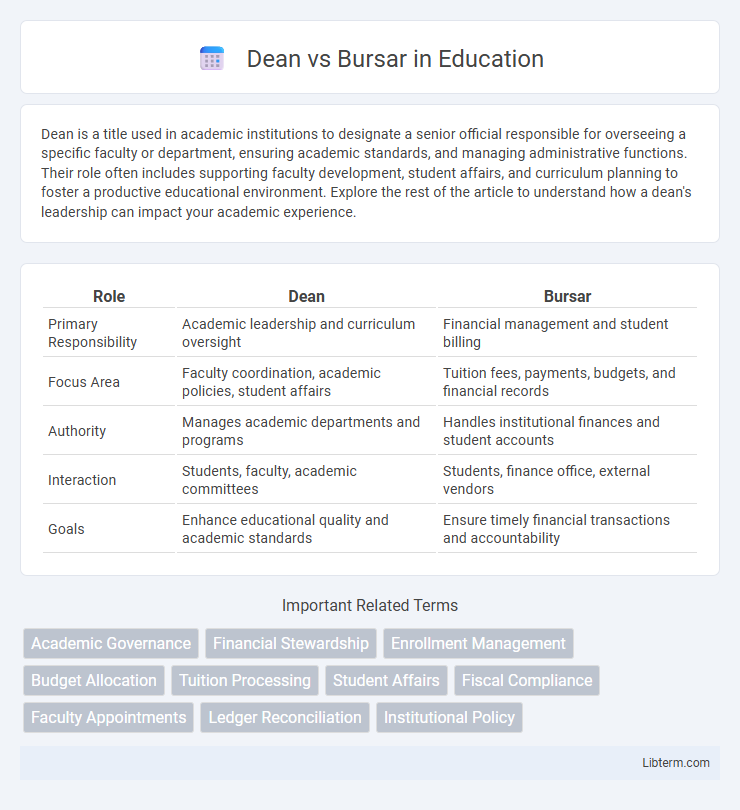Dean is a title used in academic institutions to designate a senior official responsible for overseeing a specific faculty or department, ensuring academic standards, and managing administrative functions. Their role often includes supporting faculty development, student affairs, and curriculum planning to foster a productive educational environment. Explore the rest of the article to understand how a dean's leadership can impact your academic experience.
Table of Comparison
| Role | Dean | Bursar |
|---|---|---|
| Primary Responsibility | Academic leadership and curriculum oversight | Financial management and student billing |
| Focus Area | Faculty coordination, academic policies, student affairs | Tuition fees, payments, budgets, and financial records |
| Authority | Manages academic departments and programs | Handles institutional finances and student accounts |
| Interaction | Students, faculty, academic committees | Students, finance office, external vendors |
| Goals | Enhance educational quality and academic standards | Ensure timely financial transactions and accountability |
Overview: Dean vs Bursar Roles
A Dean oversees academic policies, faculty management, and student affairs within a college or university, ensuring curriculum quality and academic standards. A Bursar manages financial operations, including tuition billing, fee collection, and account reconciliation, maintaining the institution's fiscal health. Both roles are essential for the smooth administration of educational institutions but focus on distinct areas of academic governance and financial management.
Key Responsibilities of a Dean
A Dean oversees academic policies, faculty appointments, curriculum development, and student academic progress within a college or school, ensuring educational standards and institutional goals are met. Deans also manage budgets, strategic planning, and serve as a primary liaison between faculty and university administration. Their role involves fostering faculty development, promoting research initiatives, and maintaining accreditation compliance.
Core Duties of a Bursar
The bursar manages financial operations within an academic institution, overseeing student billing, tuition payments, and account reconciliations to ensure accurate records. Responsibilities include processing payments, managing refunds, and coordinating with financial aid offices to facilitate seamless transactions. The bursar's role is integral to maintaining the institution's financial policies and supporting students' fiscal compliance.
Academic Leadership: The Dean’s Influence
The Dean holds primary responsibility for academic leadership, shaping curriculum standards, faculty development, and strategic vision within a college or university. This role directly influences student success, research priorities, and academic policies, ensuring alignment with institutional goals. In contrast, the Bursar manages financial operations, focusing on student billing, tuition collection, and fiscal administration rather than academic governance.
Financial Management: The Bursar’s Domain
The bursar manages all aspects of financial operations, including tuition payments, billing, and student account reconciliations, ensuring accurate and timely processing of funds within the institution. In contrast, the dean oversees academic programs and faculty, focusing on curriculum development and educational leadership rather than financial transactions. Effective financial management by the bursar supports the institution's fiscal health, enabling the dean to prioritize academic excellence without administrative financial burdens.
Required Qualifications and Skills
The Dean typically requires advanced academic degrees such as a PhD or EdD alongside extensive experience in academic administration, leadership, and curriculum development. Essential skills include strategic planning, faculty management, and strong communication abilities to align educational goals with institutional policies. The Bursar generally needs a background in finance, accounting, or business administration, often supported by certifications like CPA or CMA, with key skills in financial management, budgeting, and compliance with regulatory standards.
Collaboration Between Deans and Bursars
Deans and bursars collaborate closely to ensure effective financial management and academic resource allocation within universities. Deans provide insight into academic priorities and departmental needs, while bursars manage budgets, tuition fees, and financial operations to support these objectives. Their partnership enhances transparency, aligns fiscal planning with educational goals, and optimizes institutional performance.
Impact on Student Experience
The dean's role primarily influences academic policy and curriculum quality, directly affecting students' educational experiences and their engagement with faculty and academic programs. The bursar manages financial transactions, impacting students by overseeing billing, tuition payments, and financial holds that may affect enrollment and access to services. Effective collaboration between the dean and bursar ensures a seamless balance between academic support and financial administration, enhancing overall student satisfaction and retention.
Challenges Faced by Deans and Bursars
Deans often encounter challenges such as balancing academic priorities with faculty demands, managing limited resources, and addressing student concerns while maintaining institutional standards. Bursars face complexities in overseeing financial operations, ensuring compliance with regulatory requirements, and managing tuition collections amid fluctuating enrollment rates. Both roles require strategic problem-solving skills to navigate internal conflicts and external pressures effectively.
Choosing Between a Dean or Bursar Career Path
Choosing between a Dean and Bursar career path depends on your interest in academic leadership versus financial management within educational institutions. Deans typically oversee academic programs, faculty affairs, and student success initiatives, requiring strong leadership and strategic planning skills. Bursars manage budgeting, tuition payments, and financial operations, demanding expertise in accounting, finance, and regulatory compliance.
Dean Infographic

 libterm.com
libterm.com